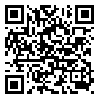Volume 28 - Supplementary
IBJ 2024, 28 - Supplementary: 290-290 |
Back to browse issues page
Download citation:
BibTeX | RIS | EndNote | Medlars | ProCite | Reference Manager | RefWorks
Send citation to:



BibTeX | RIS | EndNote | Medlars | ProCite | Reference Manager | RefWorks
Send citation to:
Barzegari Nasrabad F, Dehghani F, Ebrahimi Sheikh Shabani L, Khavari Z. Strategies to Prevent Medical Errors in Nursing Student: A Systematic Review. IBJ 2024; 28 :290-290
URL: http://ibj.pasteur.ac.ir/article-1-4723-en.html
URL: http://ibj.pasteur.ac.ir/article-1-4723-en.html
Abstract:
Introduction: Administering medication is a vital aspect of the treatment process and a critical responsibility of a nurse. Medication errors by healthcare provider groups are among the most significant factors affecting patients’ safety. Errors made by nursing students are often caused by factors such as lack of knowledge, high professor-to-student ratios, and limited experience and skills. Medical error rates among students appear to be higher than reported. Despite their importance, half of the students who make medical errors do not report them. Therefore, considering the high prevalence of medication errors and their impact on patient safety, this study was designed to identify strategies for preventing medication errors among nursing students.
Search Strategy: This systematic review study was conducted based on the Preferred Reporting Items for Systematic Reviews and Meta-Analysis (PRISMA) guidelines. Reference data were obtained from PubMed, Scopes, Google Scholar, SID, and Magiran databases in the period 2015 to 2024. Twenty five articles were finally selected according to the inclusion criteria.
Results: The study findings showed that the main reasons for medication errors among students were a lack of pharmaceutical knowledge (unfamiliarity with drug brand names, drug interactions, and drug side effect), poor skills in drug calculations, and unclear medical prescriptions. The most effective strategies for reducing medication errors included revising the educational curriculum of nursing (increasing the theoretical pharmacology time and matching pharmacology education with students' practical needs), respecting and accepting students' rights, creating learning opportunities through developing a standardized lesson plan, and having a mentor in clinical settings, as well as enhancing students' communication skills and teamwork spirit (conducting daily group discussion sessions about patients).
Conclusion and Discussion: Revising the nursing curriculum and implementing modern teaching methods to create challenging environments for students before entering the internship period can help prevent medication errors.

Search Strategy: This systematic review study was conducted based on the Preferred Reporting Items for Systematic Reviews and Meta-Analysis (PRISMA) guidelines. Reference data were obtained from PubMed, Scopes, Google Scholar, SID, and Magiran databases in the period 2015 to 2024. Twenty five articles were finally selected according to the inclusion criteria.
Results: The study findings showed that the main reasons for medication errors among students were a lack of pharmaceutical knowledge (unfamiliarity with drug brand names, drug interactions, and drug side effect), poor skills in drug calculations, and unclear medical prescriptions. The most effective strategies for reducing medication errors included revising the educational curriculum of nursing (increasing the theoretical pharmacology time and matching pharmacology education with students' practical needs), respecting and accepting students' rights, creating learning opportunities through developing a standardized lesson plan, and having a mentor in clinical settings, as well as enhancing students' communication skills and teamwork spirit (conducting daily group discussion sessions about patients).
Conclusion and Discussion: Revising the nursing curriculum and implementing modern teaching methods to create challenging environments for students before entering the internship period can help prevent medication errors.

| Rights and permissions | |
 |
This work is licensed under a Creative Commons Attribution-NonCommercial 4.0 International License. |







.png)
